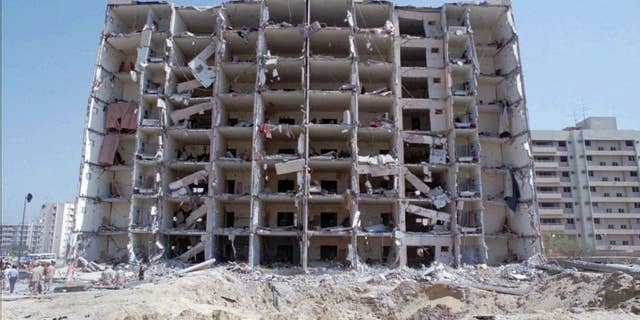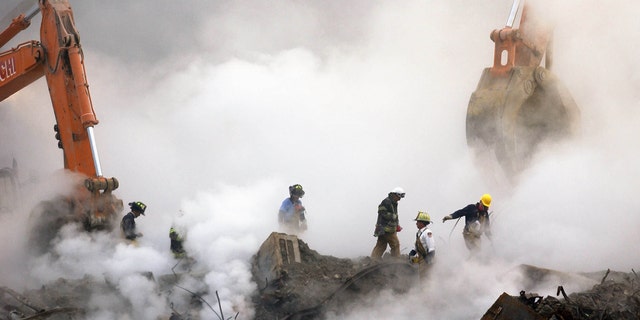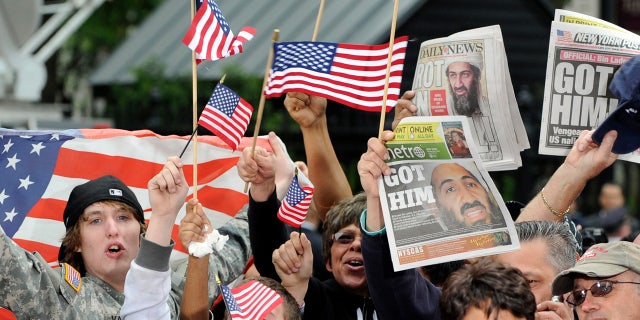NEWYou can now listen to Fox News articles!
Usama bin Laden cultivated his reputation as a terror mastermind in the decades before Sept. 11, leaving bodies strewn across continents and repeatedly landing on the CIA’s radar. The devastating attacks on New York City’s Twin Towers and the Pentagon would propel the United States into its longest war in history and solidify bin Laden’s grisly legacy.
“As a former Marine Corps officer, my career of eight years was very much defined by the Sept. 11 attacks,” author and former CIA paramilitary officer Elliot Ackerman told Fox News.
Bin Laden’s journey to becoming one of the most infamous jihadist leaders of all time began to take shape in 1979. At the urging of his mentor Abdullah Yusuf Azzam, bin Laden dropped out off college and left Saudi Arabia to join the jihad against the Soviets who had invaded Afghanistan, Ackerman said. The son of a wealthy construction magnate and close friend of the Saudi royal family, bin Laden’s role was primarily to fund training of new mujahideen, a term describing guerillas who fight on behalf of Islam.
Azzam and bin Laden went on to help found al Qaeda — which translates to “The Base” — in 1989. The Soviets withdrew from Afghanistan the same year and bin Laden returned to his home country a hero, Ackerman said. But bin Laden and his former mentor soon ended up on opposing sides of a violent debate about the future of jihad.
NYC AIR TRAFFIC CONTROLLER RECALLS HIS EXPERIENCE WORKING ON 9/11: ‘COMPLETELY AGHAST’
 
“We start to see the definition of what al Qaeda and many jihadists term as the ‘near enemy’ versus the ‘far enemy,’” Ackerman said. “The ‘near enemy’ were the authoritarian regimes in the Middle East, like the regime of Saddam Hussein, or even the Saudi royal family, which many jihadists felt were corrupt and needed to be toppled. The ‘far enemy’ was viewed as the Western democracies, foremost among them the United States, that propped up these despotic regimes in the Middle East.”
Azzam wanted to focus on the “near enemy,” but bin Laden had his sights set on the West. On Nov. 24, 1989, a car bomb in Peshawar, Pakistan, killed Azzam, effectively ending the debate. Authorities never identified a definitive culprit.
FBI RELEASES NEWLY DECLASSIFIED 9/11 DOCUMENT 20 YEARS AFTER ATTACKS
On Aug. 2, 1990, Iraq invaded Kuwait. Fearing Saddam Hussein would push his troops into Saudi Arabia next, King Fahd bin Abdulaziz Al Saud accepted military assistance from the United States.
“This leads to a profound schism between bin Laden and the Saudi royal family,” Ackerman said. “What bin Laden wants is to use his jihadists, his holy warriors, to liberate Kuwait. And he is staunchly against any type of external intervention by the United States and the West.”
As the Gulf War was being waged, al Qaeda continued to actively work on a global scale. On Nov. 8, 1990, the FBI raided the New Jersey home of El Sayyid Nosair days after the slaying of Rabbi Meir Kahane, the founder of the Jewish Defense League. The FBI said Nosair “assassinated” Kahane, although Nosair was acquitted of murder and instead convicted of lesser related charges. Nosair was an associate of al Qaeda member Ali Mohamed.
“[The FBI found] extensive evidence of terrorist plots, including plans that echo the 9/11 attacks, which are to blow up New York City skyscrapers,” Ackerman said.
Saudi Arabia expelled bin Laden in 1991 for his repeated criticism of the U.S.-Saudi alliance. The Saudi government would eventually revoke his citizenship and convince his family to cut him off.
WHO IS AYMAN AL-ZAWAHRI? AL QAEDA LEADER KILLED IN AFGHANISTAN
Usama bin Laden speaks to the journalists in Khost, Afghanistan, in 1998
(Photo by Mazhar Ali Khan/AP)
Bin Laden and his followers moved first to Afghanistan, then to Sudan in a deal orchestrated by Mohamed, the same man with ties to Nosair. Bin Laden established a base for mujahedeen fighters and began planning his first major attack.
On Dec. 29, 1992, al Qaeda operatives detonated a bomb at a hotel in Aden, Yemen. U.S. troops had been staying at the hotel en route to a humanitarian mission in Somalia and were the target of the attack, but they had already left by the time the bomb went off. Two civilians were killed.
Two months later, on Feb. 26, 1993, a truck bomb detonated below the north tower of the World Trade Center in New York City. While the bombing badly damaged both buildings, killing six people and injuring more than 1,000, it was intended to topple both towers, which could have killed tens of thousands of people.
Nosair helped plan the attack while still in jail, working in conjunction with Ramzi Yousef, Ackerman said. Both men are believed to have been financially linked to bin Laden.
ICONIC 9/11 PHOTOS AND THE PHOTOGRAPHERS WHO SHOT THEM: HERE ARE THEIR STORIES

At truck bomb exploded at a U.S. military complex in Saudi Arabia, destroying Khobar Towers June 25, 1996.
(AP Photo/Saleh Rifai)
The next major attack came on June 25, 1996, when a truck bomb detonated near barracks in Khobar, Saudi Arabia, that were housing U.S. Air Force personnel. The blast killed 19 airmen and wounded 498 others, including some Saudi nationals and foreign visitors. The attack was officially pinned on Hezbollah and Iran, Ackerman said, but bin Laden and al Qaeda claimed responsibility.
On Aug. 7, 1998, al Qaeda struck two U.S. embassies with simultaneous explosions. In Nairobi, Kenya, 213 people died and more than 4,500 were injured. In Dar es Salaam, Tanzania, 11 died and 85 were hurt.
“Al Qaeda continues to target U.S. interests abroad, culminating in October of 2000 when members of al Qaeda attacked the USS Cole,” Ackerman said.
CIA DRONE STRIKE KILLS AL QAEDA LEADER WANTED IN USS COLE BOMBING, US OFFICIALS SAY
The ship was ported in Aden, Yemen, when al Qaeda operatives approached it in a smaller boat, packed with explosives. The blast killed 17 sailors and injured dozens more.
“By the time bin Laden and his associates attacked the Cole, CIA already had in place plans to kill bin Laden,” Ackerman said. “However, the Clinton administration never greenlit these plans, and in the days before Sept. 11, they remained on the shelves.”

Firefighters make their way over the ruins of the World Trade Center through clouds of smoke Oct. 11, 2001, in New York City. Nearly 3,000 people were killed when al Qaeda terrorists hijacked four planes on Sept. 11, 2001.
(AP Photo/Stan Honda)
Afghan politician and longtime mujahedeen commander Ahmad Shah Massoud tried to warn the U.S. about bin Laden in early 2001, according to partially-redacted government records. Massoud had “limited knowledge” about bin Laden and al Qaeda’s plans to attack the United States and tried to warn the American government about the terrorist leader during a speech in Europe.
Massoud wouldn’t survive to see bin Laden’s plans come to fruition. For years, he had opposed both the Taliban and al Qaeda as the terror groups gained traction in Afghanistan. On Sept. 9, 2001, two al Qaeda operatives disguised themselves as journalists and killed Massoud in a suicide bombing ordered by bin Laden.
“The table is set for Usama bin Laden,” Ackerman said. “Ahmad Shah Massoud is dead. He has a stable perch from inside of Afghanistan and almost 10 years of planning is in place, going all the way back to his failed attempt to destroy the World Trade Center earlier in the ‘90s. It’s two days before Sept. 11 and through bin Laden’s planning and financing, those attacks are imminent … and will go on to spur a 20-year war, the longest in America’s history.”
CLICK HERE TO GET THE FOX NEWS APP
Al Qaeda terrorists hijacked four planes on the morning of Sept. 11, 2001, flying two of the planes into the Twin Towers of the World Trade Center in New York City. Hijackers flew a third plane into the Pentagon in Arlington, Virginia. The passengers and crew members of the fourth plane fought back and crashed the plane into a field in Pennsylvania before it could reach Washington, D.C. The attacks killed 2,977 people in the largest loss of life from a foreign strike on American soil.
A U.S.-led military coalition began its invasion of Afghanistan within a month, with the goal of driving out bin Laden, al Qaeda and the Taliban. American troops stayed in the country for the next two decades before the calamitous withdrawal in August 2021.

A crowd celebrates news that Usama Bin Laden is dead May 2, 2011, in New York City.
(Christopher Evans/MediaNews Group/Boston Herald via Getty Images)
Bin Laden, meanwhile, eluded capture for nearly 10 years. Finally, U.S. intelligence tracked the 54-year-old terror mastermind to a compound in Pakistan. In the early hours of May 1, 2011, a team of Navy SEALs raided the compound, killing bin Laden and four others, prompting international celebrations.